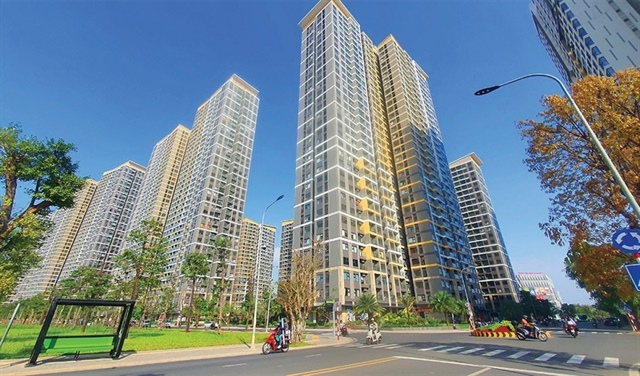Rules relaxed for a more inclusive market
Rules relaxed for a more inclusive market
Michael Piro, chief operating officer of Indochina Capital, spoke to VIR’s Hoang Anh about witnessing radical changes in the Vietnamese real estate market and the basis for his unbreakable faith in future prospects in the sector.
How would you evaluate the potential of the Vietnamese real estate market?
I think there are incredible opportunities at hand, but like in any market with a lot of opportunities, there are inherent risks. The Vietnamese economy is growing at about 6.8 per cent, one of the highest growth rates in the world. We also have a demographic profile to support real estate development: about 3 per cent of the population is migrating into the cities, resulting in a very strong urbanisation rate, and when I look at the opportunities for us at Indochina Capital, the hotel and hospitality markets are quite compelling. International arrivals are up nearly 30 per cent, but what is even more interesting is that domestic arrivals are in excess of 70 million. Since the costs of travel were brought down by Vietjet, Jetstar, and others, more Vietnamese people travel. Additionally, GDP per capita has reached $2,400. Economists say the $2,000 threshold is the inflection point where consumer spending really picks up, and this is evident in hospitality and consumer spending. Overall, the potential of the Vietnamese real estate market is extremely strong.
What have been the most prominent changes in the industry during your time here?
A lot has changed. I have been here for about 12 years, doing real estate the entire time. I would say the biggest change is that domestic developers are rising to dominance. When I came, the main projects were carried out by foreign developers using foreign capital, but over the last 10 years, we have seen local players emerging as the dominant developers. We see this in the cases of Vincom, FLC, and Novaland. They control all the major projects now, which is a major shift–and this is good. The domestic market should be dominated by domestic players.
Foreigners are now permitted to purchase and own residential units in Vietnam. How has this impacted foreign direct investment (FDI) inflows to the domestic real estate sector?
I think the changes had a tremendous impact. If you look at most high-end projects throughout Vietnam, the 30 per cent quota for foreign ownership has been maxed out.
I started selling real estate to foreigners about 12 years ago in Danang. At the time, I had to travel to Hong Kong or China to do real estate shows and to get one buyer here, one buyer there. Now, we have a real estate brokerage division called Indochina Properties and our biggest problem is that we do not have enough products to sell. Now, foreign buyers are actually chasing me for properties. I think this is a tremendous shift. The Vietnamese government has done a good job relaxing policies to encourage foreign investment in real estate and I think this trend should continue. Vietnam has been continuously relaxing foreign ownership regulations. When I first arrived, it was highly restricted. After a few years, they introduced the 50-year lease for foreigners. Then they allowed ownership of one property for Viet Kieu. A few years later, Viet Kieu could own multiple properties. Another few years later, foreigners were allowed to lease property for 70 years.
Now, we see a pretty much equal playing field between foreign and Vietnamese real estate investors. There is still a little way to go, but the trend has always been progressive. Although Vietnam has not been very fast in liberalising foreign ownership regulations, it has been very supportive and foreign investors are encouraged by these trends. This progress is less restricted than in some markets like Thailand. I think Vietnam is sending a great message to the world with this.
What is real estate investors’ biggest worry in Vietnam?
Canada, where I am from, has a land mass of about 10 million square kilometres, while Vietnam has about 330,000sq.km. So Canada is about 30 times larger, but its population is only a third of Vietnam’s. Just looking at these numbers, it is clear that the demand for land in Vietnam is going to be very strong and I have no doubt of the long-term potential of the market. We only need to balance what happens between now and then.
With its unpredictable cycles, the real estate business is always difficult. We conduct a lot of predictive studies to prepare for when the cycles change, but the truth is nobody truly knows. This is a young, developing, and relatively immature market, which brings tremendous opportunities at the cost of increased volatility. This makes the risk profile different from developed markets.
Investors from Canada, Europe, or Japan are likely used to a more mature market, while in Vietnam you can seize opportunities that take you very high, but you have to be ready for things to come down more quickly. It comes down to your timing, understanding of the country, and managing the risks–but overall, market conditions are great, the government is extremely encouraging towards foreign investors, and I think now is a great time to enter.
Which real estate segments will you focus on in Vietnam in the future?
Indochina Capital and our partner Kajima have a clear strategy to focus on pretty much anything with a bed in it–hotels, residential units for sale or serviced apartments, everything. This is our primary focus, which represents about 70 per cent of our portfolio. For the remaining 30 per cent we are looking at office, logistics, and industrial properties, but we think we mainly want to support the growing population and tourism by getting people a bed to sleep in.






















